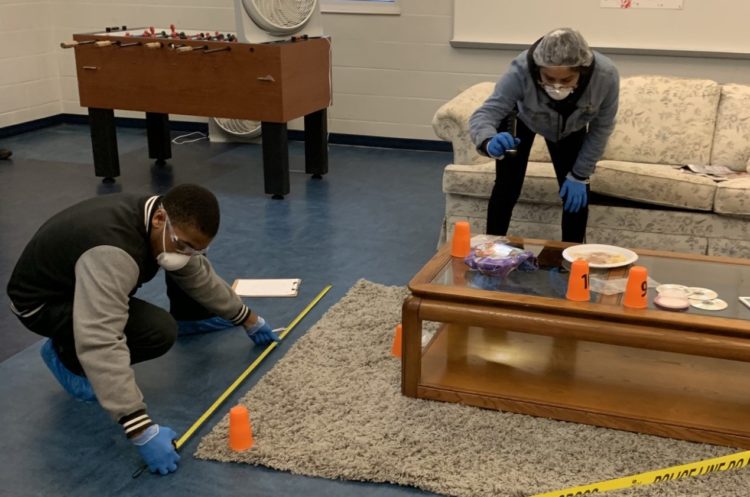Sept. 22, 2020 – Criminal justice fascinates the public – it’s why we obsess over true crime podcasts and documentaries. While most citizens are happy to keep their distance by listening through headphones or watching TV screens, some envision themselves in uniform, stepping up to the plate to help protect and strengthen their communities.
The Criminal Justice Academy at A. Philip Randolph Career Academies prepares students for a career in law enforcement or criminal justice. Instruction focuses on the daily duties of police officers and other professionals committed to keeping our communities safe.
As they learn what it takes to protect and serve, students participate in mock trials, crime scene investigations, accident investigations, crime scene sketching, budget development, police reports, educational field trips, and community service projects.
Through role-play with instructors and peers, students explore the real-world applications of law and policing policies. They practice foot patrols, responding to emergencies, making arrests and forensic investigations, as well as writing reports about their experiences.
Criminal Justice Instructor, Kim Lockley, gives more insight into the academy and a peek at what students can expect from the program.
What does the Criminal Justice Academy offer DCPS students?
The APR Criminal Justice Academy is a NCAC National Model Academy that offers a four-year Criminal Justice program for students to explore the three parts of the CJ system; Law Enforcement, Courts and Corrections. This includes the study of the juvenile justice system and crime scene investigations. Students have the opportunity to obtain an Unarmed Private Security License and 911 Telecommunications state certification.
What cool stuff do your students get to experience in the academy?
We have a police-equipped vehicle in the classroom in which students get to learn about the operations of the vehicle. The in-classroom courtroom teaches students about the courtroom participants and gives them courtroom experiences via mock trials. We have a crime scene and forensic science lab which allows students a real-world experience in crime scene processes. In addition, students participate in a physical competition through the on-campus obstacle course where they learn about the importance of physical fitness in law enforcement.
How does the forensics lab help students learn about criminal justice?
We have an entire classroom dedicated to giving students hands-on experiences in the program. The combination lab houses a 911 Telecommunication room with simulators that have actual Duval street information for the students to experience local communications in a command center atmosphere. Students get really excited about using the crime scene rooms. The crime scene area consists of three different set up for students to observe and process. It is scenario based and the students work as a team. They are assessed on the knowledge learned in the classroom. The newly designed forensic lab is a work area for process fingerprints, tire tracks, teeth impressions and other evidence collected during their crime scene investigation.
What certifications can students earn?
Students have an opportunity to obtain an Unarmed Private Security License and 911 Telecommunications state certification.
What careers are available for students once they graduate?
Students have the option of attending college or going directly into the work force. Students can work in Security and 911 Telecommunications post-secondary without further training. Students who desire to be law enforcement officers, correctional officers, crime scene analyst, bailiffs, paralegals etc. must seek further education and/or attend a law enforcement academy.
Earning a criminal justice degree is, without a doubt, a smart choice. The need for police officers and detectives is expected to grow in the coming years. Other options include crime scene investigators, forensic accountants, prison psychologists, and even social workers.
If you want an exciting, stable career with great benefits and lots of opportunities, start exploring A Philip Randolph Academy and find out what a career in criminal justice can do for you.
The Criminal Justice Academy is one of many programs supported by the Career & Technical Education (CTE) Department of Duval County Public Schools. Rebecca Miller, a CTE specialist with the district, will be writing a regular blog that highlights the many district CTE programs offered.








